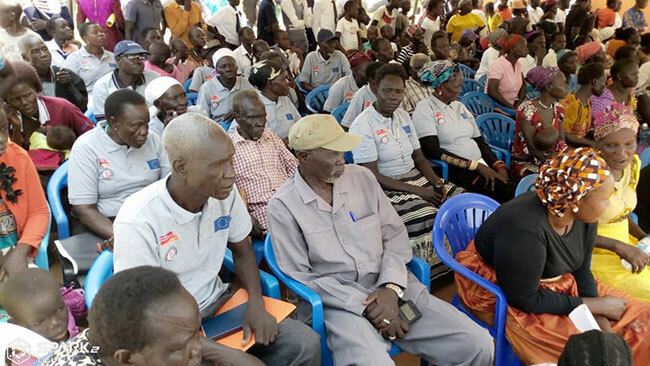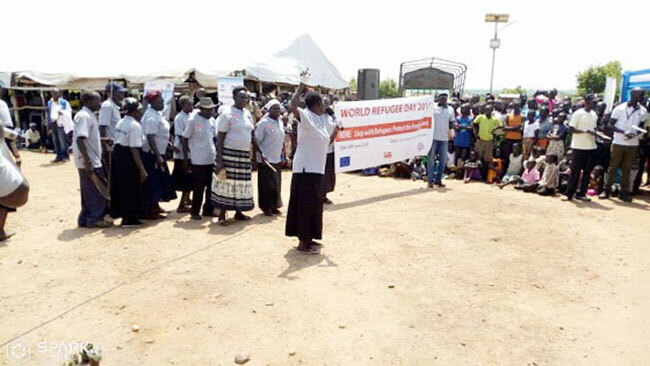Elderly refugees root for special treatment in settlements
Although Uganda has the most progressive refugee policy in the Eastern African region, organisations advocating for rights of the elderly want the government to integrate the national older persons policy of 2009 in refugee programming in Uganda.
SETTLEMENT REFUGEES
ADJUMANI - Mary Rose Juwa, 67, a resident of Pagirinya settlement in Adjumani district fled from Juba, South Sudan in 2016. Juwa, who came along with her son and three grandchildren says her major challenge is accommodation.
"I am weak and frail. I do not have the energy to cut grass, trees and make bricks to build myself a bigger house," Juwa said.
In addition, I have to queue up to get dry ratios and the older persons are not allowed be served first. Even when the food is distributed, it is only posho and beans, meaning that I lack a balanced diet. Yet I do not have money to buy other food stuffs to supplement the diet.
Londinus Wani, 65, is a resident of Pagirinya settlement in Adjumani district.
Wani, also from South Sudan came to Uganda in 2017. His biggest challenge is accessing health care.
"My common ailment is general body pain but when I go to the clinics, I never get medicine. I am always advised to buy the drugs yet I do not have money," he notes.
Juwa and Wani are the reason why Uganda today is commemorating the World Refugee Day in Pagirinya settlement in Adjumani district under the theme: Step with refugees: protect the environment.
The commemoration was started 19 years ago by the United Nations Refugee Agency to raise global awareness of the worldwide responsibility of refugees.
The day honours the strength and courage of refugees while raising public awareness and support.
 Some of the elderly refugees attending the World Refugee Day celebrations
Some of the elderly refugees attending the World Refugee Day celebrations
Emergency programming for older refugees
Although Uganda has the most progressive refugee policy in the Eastern African region, organisations advocating for rights of the elderly want the government to integrate the national older persons policy of 2009 in refugee programming in Uganda.
"The refugee response plan does not address the issues of older persons. Therefore, the national older persons policy should be integrated into refugee programmes and service delivery mechanisms," the Chief Executive Officer, Uganda Reach the Aged Association (URRA), Frederick Ouma Bwire said.
According to John Orach, a member of the national council for older persons, the policy outlines the governments plan for improving the welfare of the elderly.
This includes issues such as food and nutrition, water and sanitation, shelter, education and the different roles various sectors should play.
"The policy should also inform any legislation that comes up for older persons," Orach noted
Bwire said the integration will facilitate the planning, management, monitoring and reporting on the protection, livelihood and other services to older persons in refugee settlements for peaceful co-existence and integration of refugees and host communities.
According to the UN definition, an older person is someone aged 60 and above.
Project Manager HelpAge International, Joselyn Birigwa said older persons are excluded in the planning process of programmes that serve refugees. Consequently, the existing programmes are not responding to the needs of older persons," Bigirwa noted.
She said older refugees living within the country continue to face several protection risks. She blames it on various humanitarian agencies not being more inclusive and responsive to the needs and rights of the older persons.
Uganda has made greater strides in establishing progressive policies on refugees. Specifically, Uganda's Refugee Act (2006) has been hailed globally as the most progressive in the region.
Uganda is a signatory to the United Nations 1951 Refugee Convention, the 1967 Protocol, and the OAU 1969 Convention; hence, the legal framework that guides on refugees protection is formally integrated into Uganda's National Development Plan II (2016-2020) through the Settlement Transformation Agenda (STA) that is linked to the Refugee and Host Populations Empowerment Strategy (ReHOPE) 2016 - 2020 that calls for peaceful co-existence and integration of refugees and host communities.
Bwire said failure to integrate these progressive laws with the emerging population of aging dynamics leaves older refugees exposed to abuse, exploitation, and discrimination.
 Elderly refugees in a procession ahead of the World Refugee Day celebrations
Elderly refugees in a procession ahead of the World Refugee Day celebrations
Reports show that older persons in refugee settlements suffer psychosocial torture and neglect.
A recent Protection study by HelpAge and Uganda Reach the Aged Association (URAA) on older South Sudanese refugees in Adjumani, northern Uganda revealed that six in 10 older persons live in fear of safety and that access to services was not only inadequate but is also not age-friendly.
Safety concerns are most pronounced at distribution points with 67% and 33% at community centre within the settlements of Ayilo, Nyumanzi, Majji 1, 2 and 3, Pagirinya in Adjumani.
Birigwa called for interventions that facilitate better protection services, improvement in practices of planning and delivery of services, considering attitudes of persons of concern towards the elderly.
Statistics
According to the OPM-UNHCR verification findings for settlements and OPM refugee Information Management Systems (RIMS) data for settlements by May 2019, the refugee population stands at 1,276,208. About 3%, (34,501 ) of the refugee population are older persons.
The refugee population is anticipated to grow to 1.73million individuals by the end of 2020, taking into account likely scenarios for influxes, population growth and possible opportunities for voluntary return in safety and dignity.